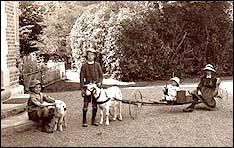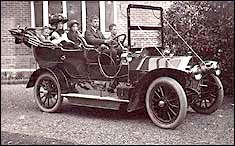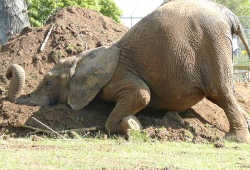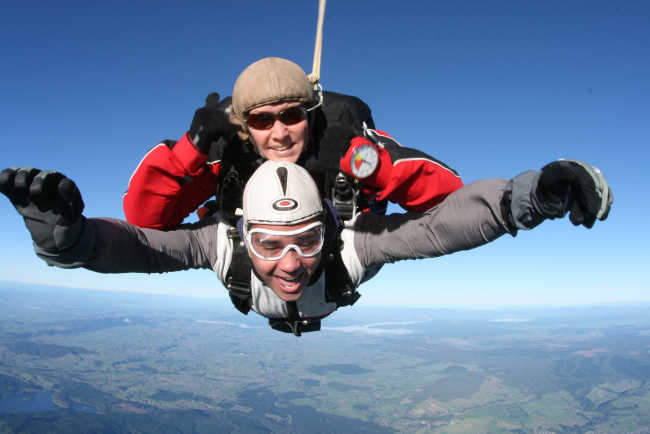Interview with Dorothy – 24/9/99
Growing up in New Zealand in the first quarter of the twentieth century.
Roger Ballantyne (born in 1909) recalls a life of busy activity as he grew up.
 |
| The Ballantyne family at Nydfa. Left to right: Colin, Ronald, Roger, and Gertrude Photo source Roger Ballantyne Click here to view a larger version |
I grew up on a one hundred acre farm in Upper Riccarton, now a busy suburb
of Christchurch. We lived in Hansons Lane in a large brick homestead called Nydfa, which means ‘Nest’ in the Welsh language.
Being taught right conduct It was a nest of security for us. We were well cared for by loving parents
and gained some of our security by knowing what was expected of us at all
times. I do not remember being trained in manners and respectful behaviour.
It was taken for granted that we would follow the example set for us.
Meals We all ate dinner at the family dinner table and were expected to eat whatever was put on our plates. Grace was said before the meal. We seldom
ate out at restaurants or hotels. Our meals were prepared for us at home.
Our mother had the assistance of a live-in housekeeper. I remember having
to dry the dishes.
Food was delivered to the house by the grocer, greengrocer, baker and butcher. To keep food cool in summer we had an ice chest for which blocks
of ice were transported from town.
Timetable There was a regular pattern to life at Nydfa. Homework had to be started
before dinner and if necessary finished after dinner before any other activity was allowed. Bedtime for years was at 8.30.
Tasks around the property My father was mad on animals. On the property there were three ponies, at
least ten Sealyham terriers, and a similar number of Scotch terriers. Added to that were goats, an Old English sheep dog, ducks, chickens, canaries and doves. There were pigs kept in a sty which had a sunshine
roof that could be rolled back in good weather. All these animals were
pets apart from the two work horses which pulled the trap to town to take
my father to work in the family business. Having so many pets taught us to
love animals and care for them. They all had to be fed, and there were
spacious lawns to be mown and a large vegetable garden to be tended. We
had to clean out the fireplace, bring in wood and reset the fire each morning. There was no shortage of chores for me and my two brothers and
two sisters.
My father believed that children should be kept busy, so we moved through a
graduated list of tasks around the property as we grew older. My parents
believed in equality and the boys and girls in the family were treated alike, but it was understood that we boys would do the rough work and that
we would always treat our sisters with courtesy.
At the times when children now watch television we were busy with jobs or
activities most of the time. All of us were taught to ride the ponies and
would ride over the farm. On wet days we boys would work in the well-equipped workshop learning woodwork and metal turning and making gates
and hurdles for use on the farm. Our father strongly believed in training
us to be useful and good with our hands.
Washday It was the boys’ job to light the copper at 6 a.m. on washdays. The fire
lit under the copper of cold water brought it to boiling point for the white washing.
If we were not at school we would turn the handle of the washing machine.
This was a wooden barrel capable of taking 100 lb. of washing. Wooden pegs
inside the barrel kept the clothes moving. We would also help to hang out
the washing on the clothes line and then lift it with a wooden prop.
Water supply Two thousand gallons of water was stored for the household. Two windmills
were used to pump the water. They were attached to a crank shaft which
operated the pumping equipment. The boys had to oil the windmills and keep
them in good working order.
With a good water supply the house had a flush toilet and its own septic
tank.
Water for the farm came from a water race which brought water from the Waimakariri River as far away as Darfield – over twenty miles.
Cleaning We also helped with the cleaning, sweeping floors, beating carpets hung on
the clothes line, and using a carpet sweeper – a Ewbank model, which was
most efficient. Two rotating spiral brushes threw the dust into the box
which was emptied at regular intervals.
Gas supply From 1909 the household had its own acetylene gas plant to supply gas to
light the house. Every week the carbide had to be replaced and the old
carbide had to be removed and buried.
Pocket money and saving For doing our work around the house and farm we children were paid a small
sum of pocket money, some of which had to be banked each week. That trained
us in the habit of saving and in budgeting for any purchases.
Games Toys included a play house and a rocking horse. We had a model car, but
took little interest in it. As we grew older we played cards – five hundred, patience and crib. We also enjoyed dominoes, draughts, snakes and
ladders, and Monopoly. Cricket was always popular. We enjoyed having stories read to us, often by visiting aunts.
Education I started at Miss Old’s school, Te Whare, opposite the present Christchurch
Police Station. Then I went to Dunelm, a primary school for boys, and from
there to Christ’s College. As in other primary schools we used to recite
tables every day, and I have never felt the need of a calculator. I took
great pride in my spelling. We were taught a variety of subjects including
grammar, nature study, singing, dancing, poetry, French and Latin. I think
that learning Latin has been very valuable as a training in the use of language.
Transport I travelled to school in the tram. Travelling on the tram was a sociable
activity as the same conductors and motormen were on the same timetable
most days. If a regular passenger were a little late the tram would wait.
On one occasion I was even allowed to drive the tram – a great excitement.
When I was older I sometimes rode a bicycle to school. I remember riding
in Canterbury’s nor’west winds and with the unsealed dusty road being covered in grime. Water carts with huge tanks sprayed the roads to reduce
the dust.
 |
| Mrs Ballantyne and family in the car in 1915, Roger on the far left. Photo source Roger Ballantyne Click here to view a larger version |
My parents never drove the car, so we boys learnt to drive at a young age.
Entertainment Highlights were visits to the zoo, the circus, the theatre and the silent
films. I specially remember going to the Liberty and Grand picture theatres in Cathedral Square on Saturday nights when they had a good orchestra. During the week there was a pianist.
A memorable experience was visiting Father Christmas in “The Toy Cave”, a
basement shop on the corner of Gloucester and Colombo Streets. We enjoyed
travelling to Dunedin by train and spending Christmas holidays with relatives at Sawyers Bay near Dunedin. We also spent holidays at Governors
Bay on the Lyttelton Harbour.
The end of the war and the influenza epidemic in 1918 The end of the war was signalled to the people of Christchurch with whistles and bells sounding everywhere. Andersons Foundry in the city had
such a loud whistle that it could be heard in Upper Riccarton. The Union
Jack was immediately hoisted on the fifty foot flagpole in the front of the
Nydfa property. There was great rejoicing all around Christchurch.
After the joy came the suffering caused by the influenza epidemic. I can
clearly remember having to go into the coalhouse twice every day while sulphur was burnt there as a form of fumigation. There is no proof of the
efficacy of this procedure, but none of the family developed the flu.
Links with Britain Education was oriented towards Britain with the teaching of mainly English
literature and British history. The cadet corps at the boys’ secondary
schools used to march through the city on the King’s birthday. “God save
the King” was played at the beginning of concerts or films and everyone in
the theatre stood to attention. Britain was referred to as “Home” as in
having a trip Home.
Looking back – an overview I feel that the upbringing given me by my parents has stood me in good stead. Learning by example worked well for the young of the day. I learnt
skills by beginning with simple tasks, just as happened when I went to work
in the family business. I started there sweeping the floor and worked my
way up to being the Managing Director. Starting by doing menial tasks teaches people respect for others and also earns their respect.
This is the first in a series of articles on “Growing up in New Zealand” –
articles which will give a picture of family and social life in New Zealand
in the four quarters of the twentieth century.




